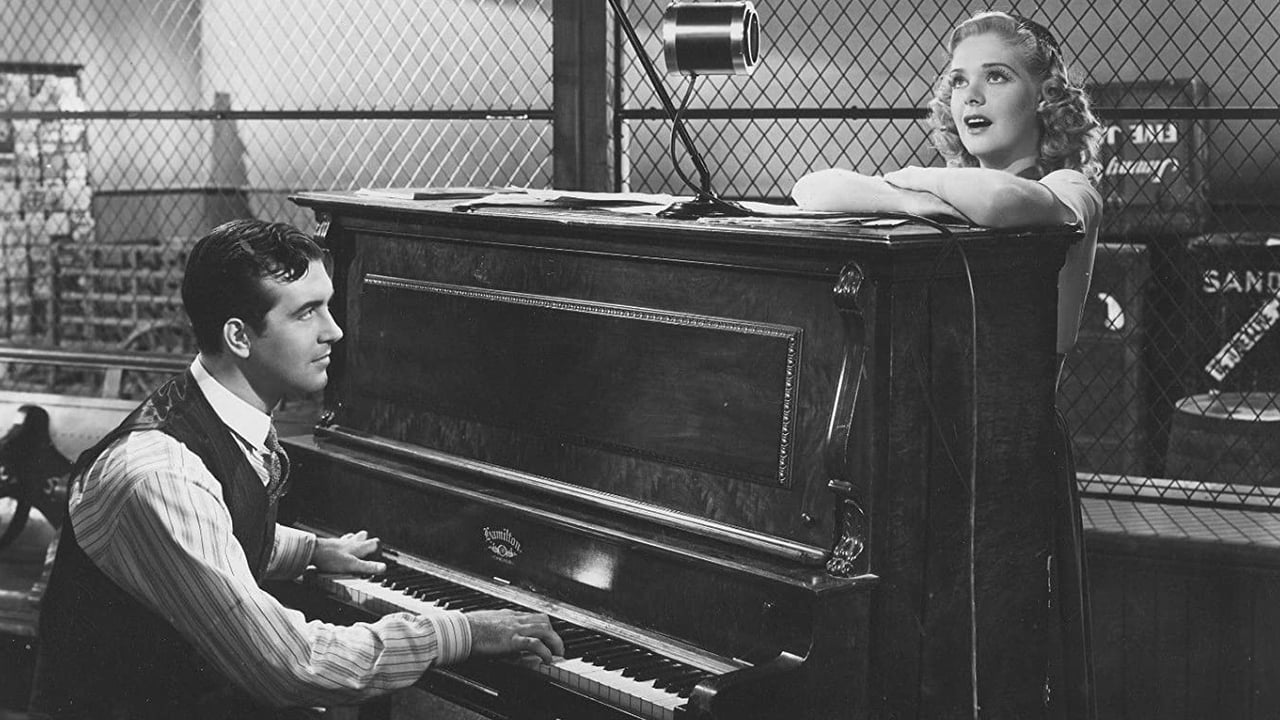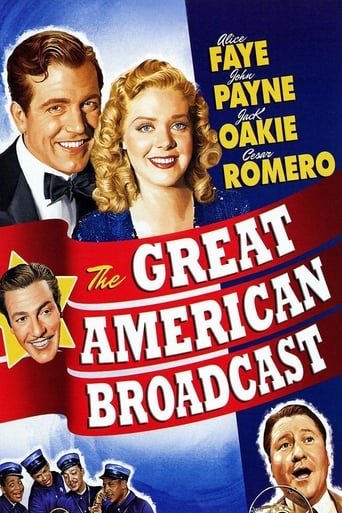



Very well executed
not horrible nor great
Gripping story with well-crafted characters
It's a good bad... and worth a popcorn matinée. While it's easy to lament what could have been...
View MoreThe Great American Broadcast marks the first of four films that Alice Faye teamed with John Payne at 20th Century Fox. It has long been a contention of mine that Payne was signed by Darryl Zanuck because he looked a whole lot like Tyrone Power and could sing and thus carry his end of musical films with Alice, Betty Grable, June Haver, etc. Funny thing is when he left Fox, Payne abruptly stopped doing musicals and concentrated on all kinds of other films. He never sang a note on screen after 1946. Putting it mildly this is not the history of the origin of commercial broadcast radio. Still it's a pleasant 90 minutes or so of musical entertainment with Alice Faye, John Payne, Jack Oakie, the Ink Spots, the Wiere Brothers, and the tap dancing Nicholas Brothers. I won't even quibble about how one enjoyed the Nicholas Brothers tap dance on radio. In 1919 flier John Payne, radio electrician Jack Oakie, saloon singer Alice Faye, and millionaire Cesar Romero essentially all team up to launch commercial radio. If you're wondering what Payne's specialty and what he brought to the table, he was the promoter of the bunch, a role he would repeat in Tin Pan Alley and Hello Frisco Hello also with Faye and Oakie. Alice has all three of these guys panting for her, but her heart belongs to Payne even though he's a bit of fathead and doesn't appreciate what he has.Harry Warren and Mack Gordon wrote the songs for The Great American Broadcast, the best of which is I Take To You which should have done a whole lot better in record sales. Oakie has a very funny bit trying to fake an operatic tenor during an early broadcast.The event which launches the quartet in the broadcasting business was the famous Jess Willard-Jack Dempsey heavyweight championship fight and director Archie Mayo did a very good job integrating newsreel footage of the fight with the cast. In the opening montage you'll also see a whole lot of radio personalities who were big in 1940. As Alice Faye is one of my real favorites I'm prejudiced, but The Great American Broadcast holds up very well after over 70 years even if it isn't the history of radio.
View MoreSo how did radio networks get started. After all, they are the precursor of modern-day TV and even computer networks. I don't know how accurate the depiction is here, but at least the screenplay got me to wondering after years of incurious radio listening. In my book, that depiction is the best part of this clearly second-rate musical. The numbers themselves vary rather wildly in quality— the Nicholas Bros. are a show-stopper and the very definition of "flying feet", while the Ink Spots shine with "Alabama Bound". I confess to even being captivated by Oakie in his underwear doing a soft shoe while warbling into a primitive microphone. However, I agree with the reviewer who characterizes the usually sparkly Alice Faye as looking unusually tired. At the same time, the Wiere Bros. violin pantomime may be the worst stage act I've seen in some time. I guess they are a matter of taste-- at best.The production itself appears to be on a strict budget, with a series of rather drab sets and only one big production number, a chorus line backing up Faye. Now I'm no particular fan of Jack Oakie's. His sometimes relentless mugging can get tiresome. Here, however, he injects much-needed energy into a romantic plot line that too often sags under its own recycled weight. The overall result looks to me like Fox doing little more than meeting escapist demand on the eve of WWII.
View MoreEven back in the early 1940s when MGM was dazzling the world with their spectacular Technicolor musicals, Twentieth Century Fox under Daryl Zanuck's direction was still turning out modest B&W musicals like this one about the early days of radio. No breath-taking dance numbers but lots of pretty if ultimately forgettable songs by Mack Gordon and Harry Warren, enjoyable specialty numbers by the Ink Spots and the incomparable Nicholas Brothers (as railroad porters!); and even a parody radio commercial sung with German accents by those madcap expatriates from the Berlin cabarets, the Wiere Brothers (the poor man's Ritz Bros.) The fast-moving plot is expertly directed by the usually lethargic Archie Mayo with lots of gags and even a bit of pathos from Jack Oakie, and enough romance between handsome John Payne and adorable Alice Faye to keep the girls in the audience happy. Fans of big studio high-style glamor cinematography will enjoy the gorgeous close-ups of Alice Faye lit by J.P. Marley and Leon Shamroy. Mike Frankovitch, who was one day to become president of Columbia Pictures, can be seen briefly as a radio announcer.
View MoreDuring the first twenty minutes or so there is actually some loose correspondence between the actual early history of radio and the history as presented here: the broadcast of a heavyweight prize fight, the proposal to broadcast a national political convention, the commercial link between the development of broadcasting and the sale of radios for home entertainment; and also the way national broadcasts began. The opening sequence before the title would have caught the attention of film goers in the forties, with brief clips of jack Benny, Fred Allen, Kate smith, Walter Winchell and other radio stars. Unfortunately, the origin and evolution of radio broadcasting becomes merely the background for a clichéd romance. However, there are some entertaining musical moments along the way. Jack Oakie stands out from the rest of the cast because of his energy, while Alice Faye, a favorite of mine from the 1930s, sings well, but seems mostly tired, except when she and Oakie are performing a song and dance number together. John Payne, Fox's back-up leading man (after Tyrone Power, who had moved on to major dramatic roles by this time), always does his job in a professional, though bland, manner. The Nicholas Brothers always impress. 20th Century Fox seemed to find some way of working them into most of the 1940s musicals. On the other hand, the Wiere Brothers are truly tiresome, supposedly performing over the radio an act that has to be seen to be enjoyed (or not, in this case). This review may sound more negative than I intended. In fact, most viewers will enjoy this hour and a half for what it is.
View More